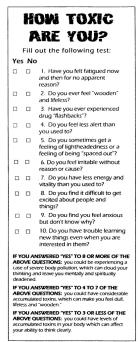Through some odd stroke of coincidence, when I was in San Francisco earlier this year, I encountered more than the usual amount of religious nuttiness. I’ve already written about the woman who gets divine communications in God’s actual handwriting. There were also Scientologists handing out pamphlets on a street corner, advertising something called the “Purification Rundown”:
One or two of these questions, like the one about drug flashbacks, would only apply to people with genuine psychological problems. But the rest of them are drawn so broadly, it’s inconceivable that they wouldn’t apply to any normal human being. If you’ve ever felt drowsy in the middle of the day or taken an afternoon nap, then you’ve “felt fatigued now and then for no apparent reason”. If you’ve ever been bored at a class, a lecture, a job or a social event, you’d probably have to admit that you sometimes feel “wooden and lifeless”. If you’ve ever been in a peevish mood, you may be “irritable without reason or cause”. If you ever daydream or let your attention wander, you’ll sometimes get a feeling of being “spaced out”.
But even if you’re some kind of emotionless android who never has any changing moods, the Scientologists still have a card to play: if you answered yes to 3 “or less” of these questions – which presumably includes answering zero – you still “could have” some level of unspecified “accumulated toxins”. Which, of course, the Scientologists will be happy to help remove, along with the contents of your wallet.
This is a time-tested strategy of religious evangelists of all kinds: a seemingly open-ended script for conversation which is designed to ensure that you end up in the same place no matter where you begin. I call this tactic “the evangelist’s funnel”.
Evangelical Christianity has used this strategy to great effect by asking people if they’ve ever done anything wrong in their entire lives, and if they answer yes, are told that they’re hellbound unless they convert. And even if you’ve never hurt anyone, lied or stolen, evangelicalism falls back on the old reliable standard of thoughtcrime. Have you ever been angry at a friend? Have you ever experienced even a fleeting moment of lust in your heart? Have you ever coveted something that wasn’t yours? Then you deserve to burn in hell for all eternity, sinner! It’s not clear how we’re supposed to avoid doing these things, since they’re entirely unconscious drives (it would be like getting blamed for yawning or blinking). Nor is it clear why God gave us those drives if he doesn’t like them; nor why he cares what thoughts we have even if we never act on them. You’re not supposed to ask those questions, you’re just supposed to fall on your knees and praise Jesus.
The most effective response to the evangelist’s funnel, rather than engaging with it directly, is to point out the implicit premises that it tries to conceal. Ask up front, “Is there any answer I could give that wouldn’t result in you advising me to join your religion?” If they’re honest, they’ll have to say no, which gives you an opening to highlight the essential dishonesty of the whole exercise. They’re not trying to engage you in a conversation, they’re trying to maneuver you into a trap. Once that’s established, you can ask what independent evidence exists for the effectiveness of their beliefs at curing the problem they claim to be able to solve.
